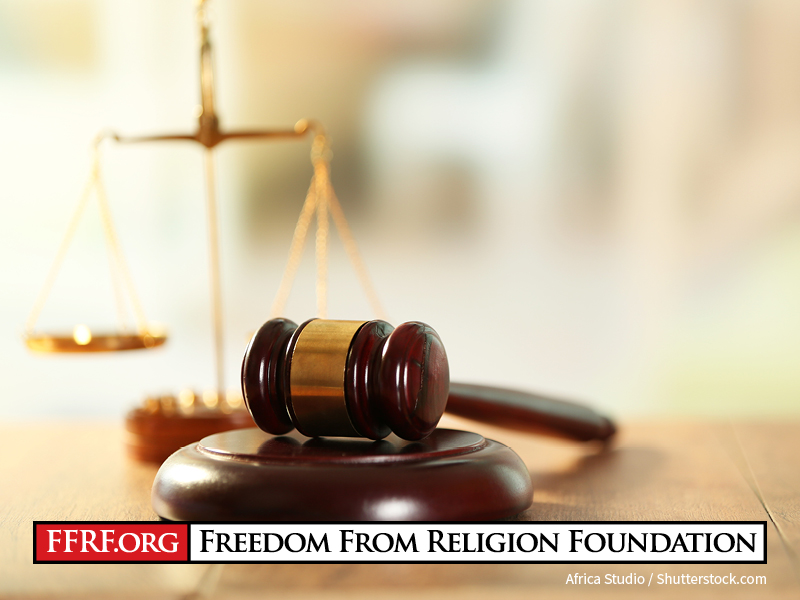
The Freedom From Religion Foundation condemns President Trump for remaking the federal judiciary in the image of the archconservative Federalist Society.
The New York Times has published a chilling analysis of the more than 185 federal judgeships filled so far during the Trump administration. These lifetime appointments include 51 Trump appointees to appeals courts, comprising a quarter of the entire appellate bench. Trump has made more appointments in only three years than during the eight years of the Obama administration.
The stacking of the appeals court with arch-conservative appointments is very significant, because, in the words of Supreme Court Justice Sonia Sotomayor, “The court of appeals is where policy is made.” A majority of appeals courts a decade ago were dominated by Democratic appointments. For example, he has appointed 10 judges to the 9th U.S. Circuit Court of Appeals, the nation’s largest and historically most liberal appeals court.
“Perhaps most telling,” the Times reports, “all but eight of the new judges have had ties to the Federalist Society.” California Sen. Dianne Feinstein, the ranking Democrat on the Judiciary Committee, has called Trump’s appellate nominees “far outside the judicial mainstream.” As a presidential candidate, Trump announced he’d let the ultraconservative Federalist Society select nominees: “We’re going to have great judges, conservative, all picked by the Federal Society.”
The Times reports that the court system’s ethical advisory arm is circulating a proposal to ban judicial membership in the Federalist Society. Many of Trump’s appointees attended the Federalist Society national convention in November.
Trump and the Federalist Society are now demanding a “paper trail” to ensure they are nominating only dyed-in-the-wool reactionaries. Three-quarters of Trump’s appellate appointees have donated to political candidates and causes, and nearly one-fourth have worked in the office of a Republican state attorney general. At least seven federal appointees have ties to the Trump administration, such as Gregory G. Katsas, who worked as White House counsel and is now serving on the powerful U.S. Circuit Court of Appeals for the District of Columbia. And at least eight appointees had actively fought against legalizing gay marriage before being nominated, according to the Times, and 18 or more have worked to limit access to contraception or abortion.
Examples of appointees meeting the Federalist Society’s litmus tests include:
- Steven Grasz, now sitting on the appeals court in Nebraska, who had been on the board of the anti-abortion Nebraska Family Alliance and the pro-capital punishment Nebraskans for the Death Penalty.
- Lawrence VanDyke, now on the 9th Circuit, who, while serving as solicitor general of Montana, urged his state to support a 20-week abortion ban in Arizona, among other policy overreaches.
- Kyle Duncan, now serving on the 5th U.S. Circuit Court of Appeals, previously fought to uphold Louisiana’s gay marriage ban, defended the controversial North Carolina law against transgenders using washrooms corresponding to their preferred gender, and represented Hobby Lobby when it sued to deny employees insurance coverage for contraceptives it disapproved of. Duncan has worked as general counsel of the theocratic Becket Fund for Religious Liberty.
- Don R. Willett, now serving on the 5th Circuit, as a candidate for the Texas Supreme Court, boasted of being “pro-life, pro-faith, pro-family.”
More than two-thirds of the overall appointments are white male, and most at least five years younger than previous Obama and Bush appointees. Almost one-third were under 45 when appointed. Their median net worth is nearly $2 million.
Only two appointments received unanimous Senate votes. The Times cites a study by the conservative Heritage Foundation showing that Trump’s appointees have received three times more “no” votes in the Senate than all the judges confirmed in the 20th century. One appointee, Jonathan A. Kobes, who was rated unqualified by the American Bar Association, was confirmed only after Vice President Mike Pence broke a tie vote. This is the only time a vice president has played such a role in ensuring the confirmation a judicial nominee.
Barely 40 percent have previously served as a judge. Trump bragged in his State of the Union address about the appointments, saying “We have many in the pipeline.” In fact, 41 nominees await confirmation to the federal (lower) courts. And, of course, Trump appointees replaced two justices on the Supreme Court.
Retired Hawaii Judge James Dannenberg recently sent a strongly worded letter and rebuke to Chief Justice John Roberts explaining why he was resigning from the Supreme Court Bar:
“It is clear to me that your court is willfully hurtling back to the cruel days of Lochner and even Plessy. The only constitutional freedoms ultimately recognized may soon be limited to those useful to wealthy, Republican, white, straight, Christian and armed males — and the corporations they control. This is wrong. Period. This is not America.”
FFRF Co-President Annie Laurie Gaylor says, “Trump’s highly problematic judges, often fast-tracked from an ideologically charged group to the federal bench, are threatening the future of the nation for decades to come.”

